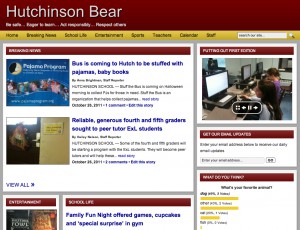Steve Jobs changed my life. I know, I know. You’ve already heard it and from every other journalist on the planet. An entire issue of Bloomberg BusinessWeek turned into instant biography. The cover of the Economist. Articles in the New York Times showing up two Sundays after the man’s death. People and the Poughkeepsie Journal. I expect Showdog Monthly and Boy’s Life to chime in.
Let’s face it. Steve Jobs lived an amazing life that is an incredible story. Americans love the chance of a comeback. (Fitzgerald was wrong; there are second acts in American lives.) And so it’s hard for editors and reporters to stay away.
There is another reason for the attention being paid. Jobs revolutionized journalism, hell all of publishing, long before upending the music, cell phone and consumer electronics industries.
In 1984, I was intrigued by Apple’s slick “1984” TV spot because of the sci-fi look, not the Macintosh computer it introduced. I was two years into my career in journalism, not in the market for a personal computer, and couldn’t afford one anyway. A year later, I was reading a very unslick newspaper trade publication, an ugly magazine that was all text—arcane, jargony text at that—topped by long obtuse headlines in ALL CAPS. The article was about Apple’s Macintosh computer, LaserWriter printer and the Postscript language built into both that this dense piece seemed to be suggesting turned the Macintosh into a typesetting machine. If so, I knew then, this would change everything.
Two or three months later, I bought the earliest Macintosh, a squat, friendly little box with two floppy disc drives (no hard drive yet). My partners and I started the Peekskill Herald using the little thing as our entire production system. And that newspaper would never have happened without the Mac. Paying a job shop to typeset the Herald would have cost twice as much as our actual printing bill. We would have run out of money in weeks.
The Herald was one of the first 20 or so newspapers in the country typeset using the Mac, Microsoft Word 1.0 and layout software called Aldus Pagemaker. Dozens, then hundreds more newspapers and magazines followed, some junking conventional typesetting equipment, while others were startups empowered by the computer that took out a dictator (well, in commercials at least). Desktop publishing was born, a revolution so complete we don’t use the term much anymore. All publishing is done on the desktop. We expect to have 50 or 100 typefaces at our disposal on a home computer and create documents that would have cost hundreds or thousands of dollars in typesetting costs.
Everything that’s happened in my life since 1985 happened because of my experiences co-founding and co-owning a newspaper built on the fundamental technological shift ushered in by Steve Jobs. Not that it was all business. There was the magic. I’m a techie and love to play with all the toys. Being honest, most are a disappointment. Rarely do I switch on a box and feel the magic. That’s why techies are techies. We go from box to box hoping it will happen again.
Switching on the first Mac was a magic moment. Things we take for granted were all new: the mouse that miraculously moved the arrow around the screen. The windows and icons and virtual desktop. A graphical environment rather than c: awaiting our turgid DOS commands.
From 1985 until now, I’ve bought Apple computers to use at home, even during the desert years when Jobs was gone and Apple tried to be a sort-of Microsoft, an almost IBM. I’ve only felt that magic three times since 1985 and Apple was responsible twice more: when I got my iPhone three years ago and the iPad last year. (If you’re wondering about the non-Apple event: 1994, when I first clicked a hyperlink on the world wide web, and the world wide world changed again.)
I’m writing this on the iPad, typing it into the Safari browser, music playing via the iPod app, using open-source blogging software called WordPress that’s all about a graphical interface. Steve Jobs is in all of it.

